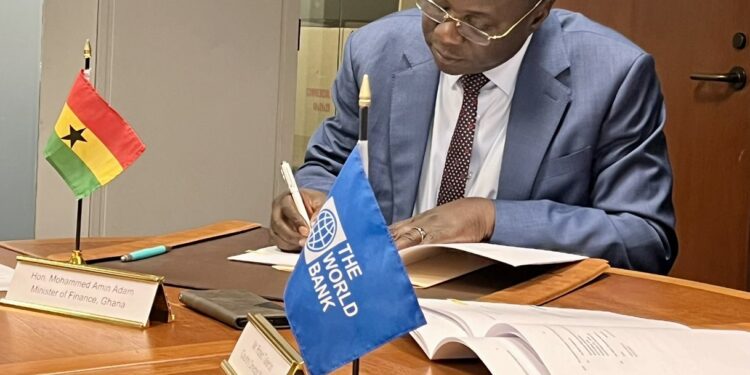Ghana Pledges to Reform Energy Sector with Enhanced Cash Waterfall Mechanism
Ghana’s Finance Minister, Dr. Mohammed Amin Adam, has pledged to strengthen the country’s energy sector through a comprehensive reform of its cash waterfall mechanism as part of a new US$260 million World Bank financing package aimed at rescuing the troubled sector.
During a signing ceremony in Washington, DC, Dr. Mohammed Amin Adam announced that the following of the cash waterfall mechanism would be central to restoring investor confidence in Ghana’s energy sector, which currently faces annual financial shortfalls of approximately 2 percent of GDP.
“All collections of bills must go to the cash waterfall system to be redistributed to all stakeholders in the country,” Dr. Adam asserted, highlighting the mechanism’s critical role in addressing the sector’s persistent financial challenges. The energy sector’s shortfall this year alone has reached GHS18 billion (US$1.2 billion).
The cash waterfall mechanism, designed to ensure systematic distribution of revenues among various stakeholders in the energy value chain, has become a focal point of discussions between Ghana and its international partners. The finance minister revealed that ongoing consultations with the US government and World Bank, and all other development partners has seen the mechanism’s future and implementation come up, underscoring its significance in the sector’s recovery plans.
The funds comes as part of a larger US$250 million credit facility and US$10 million grant agreement with the World Bank – the first such agreement to be signed in Washington DC in over two decades. The programme aims to improve the financial viability of Ghana’s electricity distribution sector and increase access to clean cooking solutions.
Ghana’s energy sector has long struggled with high distribution losses and low collection rates, creating substantial financial pressures on the economy. The Institute of Statistical, Social and Economic Research previously estimated that power crises cost Ghana between US$320 million and US$924 million annually in lost productivity and economic growth.
The finance minister also announced plans to audit the Electricity Company of Ghana (ECG), acknowledging that the utility company’s performance has been “breaking the financial integrity of the entire energy sector.” However, he expressed the government’s commitment to eventually “bring back” ECG, to the right track of profitability.
“People have lost confidence in our ability to manage the energy sector because of the financial issues,” Dr. Adam acknowledged. “We need to invest a lot in energy, and we will pay for those resources that we have invested in this sector.”
The reform package comes at a crucial time as Ghana seeks to expand its energy infrastructure to support economic growth. The minister highlighted the need for increased generation capacity and expanded transmission systems, particularly as the country attracts more investment in renewable energy.
However, he emphasized that the reforms represent official government policy rather than personal initiatives.
The World Bank-supported programme is expected to streamline operations through investments in infrastructure improvements, including prepaid metering systems and enhanced commercial management for distribution utilities.
Market observers note that the success of these reforms will depend largely on the government’s ability to implement the enhanced cash waterfall mechanism effectively and maintain the commitment to financial discipline across the sector.
The announcement comes as Ghana continues to work on stabilizing its economy following recent financial challenges. The energy sector reforms are seen as crucial for the country’s economic recovery and its ability to attract foreign investment in critical infrastructure projects.
“We are determined to change the narrative as well as the energy sector,” Dr. Adam concluded. “The cash waterfall will work.”










